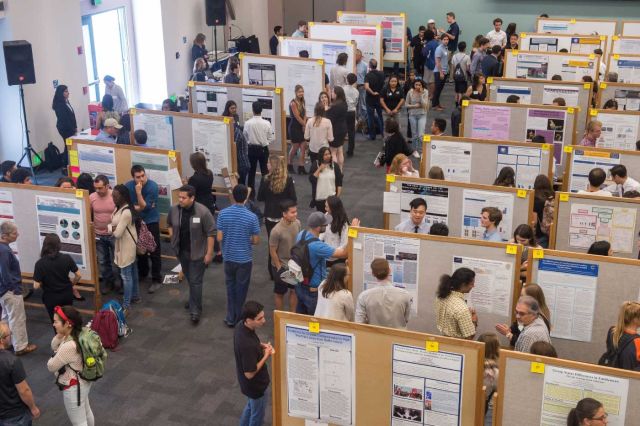Creating New Knowledge
A week of events spotlights undergraduate student-led research initiatives and projects

By Leslie Dinaberg
Many believe that no research is ever quite complete, and the true value of the work is that it opens the way for something better. Aiming to spread the joy that comes with educational discovery, UC Santa Barbara’s debut Undergraduate Research Week offers a variety of ways to share ideas.
“A university is supposed to be about the interchange of ideas and thought and I want to encourage as many students as possible to feel like they can be a part of that,” said Anne Charity Hudley, director of undergraduate research in the Office of Undergraduate Education and North Hall Endowed Chair in Linguistics, who is leading Undergraduate Research Week.
Last year’s two-day event was so popular that the undergraduate research showcase expands to a full week of events beginning Monday, May 6. The traditional Undergraduate Research Colloquium will take place Tuesday and Wednesday, May 7 and 8, in Corwin Pavilion.
“I'm really excited to see the number of projects grow,” said Charity Hudley. “The thing I like to emphasize to students is that you should share your work, no matter what stage you are in, rather than just thinking that it has to be a culminating experience. The actual discussion and sharing of ideas and information is the most important takeaway.”
The variety of projects on display will be rich and varied. Xochitl Briseno’s research — performed under the guidance of Rebeca Mireles Rios, an assistant professor in the Gevirtz Graduate School of Education — explores the role of Hispanic Serving Institutions (HSI) in supporting the Latinx scholar. It also addresses the factors that contribute to the retention and persistence of Latinx students as well as the importance of an HSI’s role in supporting high-impact practices that provide a second form of engagement to aid the second through third year transition.
Graduating senior Erika Prado’s research sheds light on the interactional competence of autistic individuals. Prado will pursue a Ph.D. in comparative human development at the University of Chicago next fall, and credits her decision to do so in part to her undergraduate research experiences — with the Department of Psychological and Brain Sciences’s Attention Lab, the Koegel Autism Center and as a McNair Scholar in the Department of Linguistics — as well as her work as a peer mentor for the Office of Undergraduate Research and Creative Activities (URCA).
All undergraduate students had the option to participate in the Colloquium, which includes traditional poster presentations; Colloquium Unbound, which includes videos, graphic novels, board games, performances and other artifacts that represent the essence of the research; or the Undergraduate Research Slam, a lively competition in which students, vying for the $2,500 prize, present their research in three minutes or less to a panel of judges.
Charity Hudley encourages students, faculty and staff to attend any or all of Undergraduate Research Week. “It’s really celebrating the students’ achievements from a developmental perspective,” she said. “We expect these research projects to grow and change over time — the more that they can learn from each other the more that will also strengthen their research. It’s more than just a showcase to show your friends or your professors your research, it’s also a great opportunity to learn from seeing what other people are doing.”
